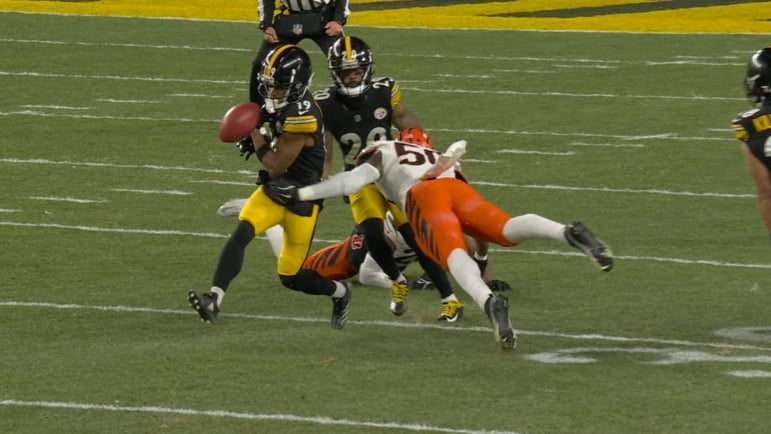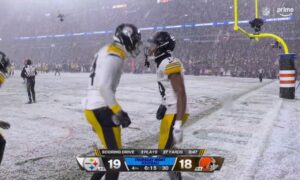Player: WR Calvin Austin III
Stock Value: Down
Reasoning: Calvin Austin III did the one thing the Steelers could not afford to do Saturday night, and that was cough up the ball. For the first time all season, the third-year wide receiver fumbled, losing the ball on a punt return. And he did very little else aside from that, an unfortunate end to his regular season.
On another day, the first stock column after this game would have to go to George Pickens. We’re going to be talking a lot about Pickens, though, so he can wait for another day. Instead, I will start with Calvin Austin III, who committed the cardinal sin for a bad offense. He turned the ball over.
Technically, of course, Austin didn’t turn the ball over on offense. At the time that he fumbled, he was returning a punt, though it didn’t hurt the Steelers much directly. The reality is they managed to take the ball back several plays later, but it hurt their ability to score. It came late in the first half, and the Bengals ate up a lot of clock.
Actually, the man who forced Austin to fumble is a familiar name. It was Bengals rookie Shaka Heyward, who is the nephew of Craig Heyward. In other words, he is cousins with Cameron and Connor Heyward. Not that it matters—the fumble still counts.
Offensively, Calvin Austin only saw one target, finishing the finale with zero catches. He ends his third season with 36 catches on 58 targets for 548 yards and four touchdowns. Not a bad season by any means, depending on what role you assign him. As a punt returner, he returned 28 punts for 289 yards and one touchdown.
The Steelers defense bailed Austin out by getting an interception before the Bengals could score. But the Steelers offense couldn’t do anything with the ball, either. Austin’s lone target was on 3rd and 8, falling incomplete as the Steelers went and out on the opening drive of the second half. He only saw the ball twice more on two short punt returns.
As the season progresses, Steelers players’ stocks rise and fall. The nature of the evaluation differs with the time of year, with in-season considerations being more often short-term. Considerations in the offseason often have broader implications, particularly when players lose their jobs, or the team signs someone. This time of year is full of transactions, whether minor or major.
A bad game, a new contract, an injury, a promotion—any number of things affect a player’s value. Think of it as a stock on the market, based on speculation. You’ll feel better about a player after a good game, or worse after a bad one. Some stock updates are minor, while others are likely to be quite drastic, so bear in mind the degree. I’ll do my best to explain the nature of that in the reasoning section of each column.








